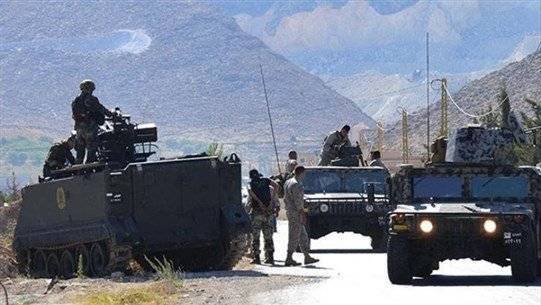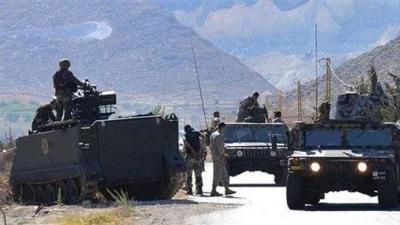The Lebanese army continued operations over the past two days to raid the homes of wanted individuals in the Baalbek area, following the escape of the wanted person A. M. Zaiter (nicknamed "Abu Sallah") last Friday. His escape occurred after an exchange of gunfire during a raid on his home in the Sharawna neighborhood north of Baalbek, which resulted in the death of a soldier and injuries to four others. Security sources confirmed to "Al-Akhbar" that "the orders are clear: the operation will continue until Abu Sallah and the murderers of the fallen soldier are apprehended."
Yesterday, the army launched a wide-ranging campaign targeting most villages inhabited by members of the Zaiter clan, including the neighborhoods of Sharawna and Tal Al-Bayda in Baalbek, as well as the towns of Addous, Reha, and Al-Kanisah, reaching Al-Karak in the central Bekaa. Strict security measures were implemented throughout the northern Bekaa region up to the Syrian border. The army discovered a drug manufacturing lab and seized quantities of drugs, weapons, ammunition, and various types of vehicles, all of which were transported to the Ablah barracks.
After receiving information about the presence of "Abu Sallah" and his fleeing companions in the town of Jbaa, a Commando unit raided the area, where clashes occurred, damaging an army vehicle and injuring three soldiers inside it with burns. Military sources clarified that the army "responded to the sources of fire, and after intervention by several women and locals, the unit retreated awaiting military reinforcements, which allowed the armed men to escape towards the western mountain range."
Despite the Bekaa residents' desire for the state's presence and to rid themselves of gangs involved in theft, kidnapping, and drug trafficking, the security operation was marred, as usual, by condemnable practices following the spread of videos showing demolition and destruction inside the raided homes. Lawyer Ashraf Al-Mousawi told "Al-Akhbar" that the security operations conducted by the army against organized gangs "are welcomed by the residents of the Bekaa and Lebanese citizens, but the actions taken by the raiding forces to demolish homes is an unusual phenomenon, not to be compared, of course, between our national army and the army of occupation." He described the actions of some soldiers on the ground as "an infringement on public and personal freedoms, and called for the government commissioner at the military court to open an investigation to determine who ordered the demolitions without any legal justification, as no rulings or laws authorize such actions."
For his part, a military official confirmed to "Al-Akhbar" that the claims about the army demolishing homes "are incorrect and far from the truth," asserting that "the demolition affected only a site used for drug trafficking specifically related to the wanted Zaiter, which was a den posing a threat to the residents of the neighborhood and the entire region, serving as a recruitment point for thousands of young men and women." He confirmed that the decision to demolish was executed based on orders from the leadership.
Baalbek-Hermel Governor Bashir Khodr urged against framing the matter as "a problem between the Lebanese army and the people of Baalbek-Hermel, who have long demanded security enforcement and pursuit of wanted individuals to live peacefully in their area. A clear indication of this is that Corporal Zain Al-Abidin Shams, who was martyred during the raids, is from Baalbek-Hermel." He affirmed that the army's security operation is "part of the war on the unprecedented spread of drug abuse in Lebanese society, and its timing is unrelated to any other issue but follows the army's operational plan based on available information and coordinates after monitoring and surveying."
In response to some measures affecting towns and the homes of non-wanted individuals during the army's raids, a delegation from the region's clans, led by Sheikh Shawqi Zaiter, visited the office of Hezbollah Shura Council member Sheikh Muhammad Yazzbik, who asserted that "not everyone affected by this operation is a criminal or outside the law," calling on the army to take its role alongside security forces in establishing order, "but to interact without impulse, hostility, or overreactions towards innocent citizens, as this is extremely dangerous." He urged "all officials and the army commander to investigate what occurred," emphasizing that "if a criminal is found among the clan, responsibility should not be placed on all members of the clan." Subsequently, the army began easing operational measures in Sharawna and other villages while continuing the security operation until the capture of "Abu Sallah."




